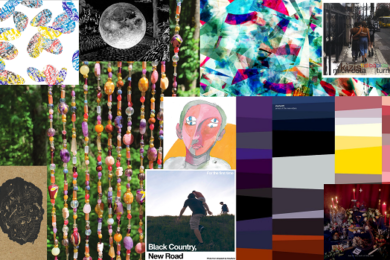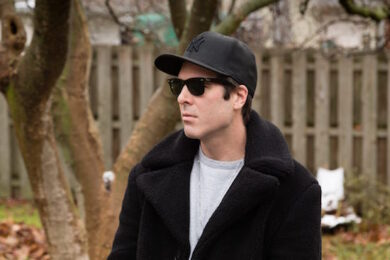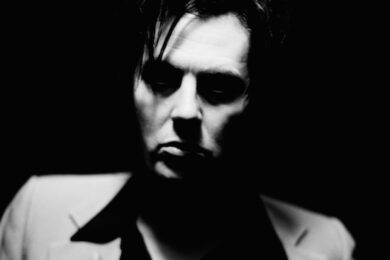In the two decades since its release, Moby’s Play has been many things: the epitome of late-capitalist muzak, infamously licensed for commercial use more than any album before or since; a thread connecting America’s post-industrial present to its rural past, through its extensive sampling of African-American folk music; and the butt of more than its fair share of jokes, a naff reminder of millennial chill-out sounds.
But Play also embodies something more important, and less thoroughly explored in the years since its release. We shouldn’t view it as a relic, but as a foreshadowing: an uncanny prediction of the precarious future we now inhabit, and the fate of a music industry about to be upended by file-sharing and the flattening malleability of the internet.
On its release in May 1999, Play faced overwhelming indifference from the gatekeepers of 20th-century pop music: major labels, FM radio, the music press and record stores. Forced to work without that infrastructure, Moby inadvertently mapped out a process that other independent artists would soon have to follow as those traditional institutions withered away. For better or worse, Play is the first record of the 21st century: the patient zero for a recording industry scrabbling to survive after the collapse of recorded music.
At the time, though, Moby’s only concern was getting to make another album. The success of his Twin Peaks-sampling Go! and the lush, enveloping Everything Is Wrong had made him a star, but one whose roots in the mid-80s punk and hardcore scene reflected a deeper discomfort with the gloss of success. Chafing against those expectations, 1996’s Animal Rights was a righteously unlistenable stew of thrash metal guitars and political sloganeering: panned by critics, it sold abysmally and industry power-brokers lost interest.
The following year, Moby’s US label Elektra unceremoniously dumped him halfway through a tour at which audiences had dwindled to double figures. “When Play was released, I kind of thought my career was over” Moby said in 2009, later describing his initial impressions of the album as “an average, slightly-experimental record that would disappear without a trace”.
This precarity is arguably the first aspect in which Play predicts the future. The very idea of a modestly-selling underground techno artist in 2019 securing a comfortable multi-album major label deal seems vaguely quaint, a reflection of an era when people still actually bought CDs. Instead, today’s independent artists are far more likely to mirror Moby as he was in 1999: wondering how to turn a profit, how to cut through the noise, whether their career might ever be sustainable, and whether or not this could be their last chance to make it.
Abandoned by a fickle and uncaring industry, Play was conceived as Moby’s swansong, a final gesture of creative surrender before sinking back into obscurity. And yet it’s precisely that sense of abandon which helped it eventually shift 12 million copies. Listening to the album through that personal lens, it becomes clear that this is not mere chill-out fodder, but a wistful and valedictory piece of work, a eulogy to opportunities squandered and a life (or one chapter of it) about to end.
That sense of nostalgia and loss pervades the second half of the album in particular, which in stark contrast to Play’s better-known tracks is uniformly downcast and almost devoid of samples, defined instead by Moby’s thin, close-miced voice and listless drums. ‘Guitar Flute & String’ is naive and morose, reminiscent of the otherworldly chintz of 70s prog rock; closing track ‘My Weakness’ drifts beautifully through vaporous and woozy terrain; on ‘The Sky Is Broken’ a sullen piano and breakbeat circle each other, as Moby admits that “nothing is left here for me”.
That mood remains ambiguous and deferential, though, never overpowering the listener or asserting a singular interpretation. It is, in short, catnip for advertisers and music supervisors: just enough emotion to sustain the audience’s empathy, but not so much that you can’t slide a bit of additional messaging alongside it. In hindsight, the precarious and pessimistic context of Play’s creation wasn’t just culturally prescient, but also key to its later success.
Play’s other chief emotional touchstone is a sense of historical familiarity, constructed through Moby’s liberal use of samples from American folk music anthologists Alan Lomax, or from later gospel recordings.
Through its use of samples Play maps Moby’s personal neuroses onto traditional American song forms, but this overlaying is fraught and inexact. Moby and Lomax have both been criticised for the power imbalances inherent in their use of African American voices: Lomax for placing emphasis on supposedly raw, unvarnished musical forms which serve to exoticise those singing them, Moby for taking those same voices and monetising them to sell perfume and tracksuits. (Lomax would also face similar criticism for refusing to give up copyright claims over the songs he recorded.)
But it’s difficult to speak in moral absolutes here: Lomax’s work has clearly played a huge role in preserving and uplifting music which might otherwise have remained obscure to many; Moby’s interviews regularly include sincere attempts to acknowledge his cultural and social debts. Certainly, Play’s slower sample-based tracks ‘Natural Blues’ and ‘Why Does My Heart Feel So Bad’ strive for a thematic and emotional sympathy with their source material, a similar sense of longing and loss which might connect them across generations and identities.
Yet even when done sensitively, the fact that the cultural work of disenfranchised, exploited minorities has ultimately served to make a white man rich can’t help but feel extractive. Perhaps Moby’s choice of samples says something not only about America’s musical history, but also its uncomfortable tendency to exploit and fetishise the work of those on the margins, even by those with progressive intentions.
The blogger Taliesin describes Play “occupying the space of the other, the church hall, the front stoop, the chain gang without even breaking a sweat, much less addressing the continued legacy of slavery in America”. Simon Reynolds, talking more broadly about the ethics of sampling, writes in the Guardian: “To take a chunk of living time – which is what a sample is – and chain it into a loop isn’t just appropriation, it’s a form of enslavement. But to pluck several different segments of live playing from separate space-time contexts and force them into unholy congress with each other … that’s sorcery”. In this, again, Play points not only to the past but to a future where questions of autonomy and appropriation would become increasingly fraught.
Having shopped the record unsuccessfully to a slew of major labels following his breakup with Elektra, Moby eventually signed with V2 in the US (his UK label Mute having stuck by him). Label indifference was mirrored by the music press, retailers, and ultimately by audiences: in their 5.0 review, Pitchfork describe Play as “a warm puddle of generic ambient, techno, and trip-hop… fun and functional, yet disposable”. Omens for touring were similarly poor: “The first show that I did for Play was in the basement of the Virgin Megastore in Union Square. Literally playing music while people were waiting in line buying CDs. Maybe 40 people came.”
And yet the process by which traditional industry support would cease to matter was already underway. A little over two weeks after Play’s release, the initial beta of Napster was made public. By the time Play finally reached number 1 in the UK in April 2000, peer-to-peer filesharing had flung the global music industry into a state of existential terror, prompting labels to sue not only the software’s owners but also hundreds of everyday music fans. The slow unravelling of an economic model based on the enforced scarcity of music as a physical product had begun.
While tedious blowhards like Metallica and Dr Dre lined up Canute-like to shout “Fuck Napster”, and generally act like the future could be reasoned with, Moby welcomed filesharing and its implications unequivocally. When the court cases started biting in 2001 and artists began disappearing from Napster’s search results, Moby declared: “I like Napster. I like the idea of people listening to my music (which is why I make my music in the first place). If I’ve been filtered out of Napster it has nothing to do with me”.
Again, Moby appears as something of an artistic vanguard here, quick to accept the inevitability of digital music as a loss leader for all but those at the very top of the pyramid: an argument that artists have, by and large, been forced to concede in the ensuing 20 years.
It’s possible to view Moby’s position as an extension of his radical politics, or a reflection of how little he had left to lose at the time. A more pragmatic explanation might be that by 2000 he didn’t need to rely on physical sales to the same extent as his peers: he’d already found a way to minimise his exposure to the implosion of the record industry with Play’s singleminded focus on the sync and licensing market.
An earlier attempt had been made by Moby’s managers to woo Hollywood music supervisors, building on the use of ‘God Moving Over The Face Of The Waters’ in the closing scene of Michael Mann’s Heat. The abject and extremely public failure of Animal Rights put paid to that plan, but the idea stuck. When Play was met with a brick wall, the next option was ad agencies.
It’s here that Play’s easily-understood but endlessly malleable emotional cues came into their own. ‘Bodyrock’ sold you adventure and energy on behalf of Rolling Rock beer; the wispy melodies of ‘Porcelain’ gave Volkwagen, France Telecom and Bosch a gloss of vulnerability and introspection; ‘Run On’ made Maxwell House instant coffee jauntier than it had any right to be. By the end of 2000, every single one of Play’s 18 tracks had been licensed somewhere, with more than 100 instances in the US alone, netting Moby a cool $1 million before a single copy of Play had been sold and providing free promotion for the album at the same time. In its first week of release Play sold 6,000 copies; 11 months later, off the back of its saturation of the licensing market, that weekly number was over 150,000.
Looking back at coverage from the time, it’s striking how novel and controversial this all seemed, a throwback to a world where notions of “selling out” still felt relevant. A New York Times article from 2000 seems positively childlike in its realisation that commercial licensing didn’t mean stepping into the world of Mad Men: “Robert and Hilarie [of indie darlings Apples In Stereo] had always imagined that advertising meant striking a Faustian deal with a soulless corporation. But when the call came, it was nothing like that”.
In a 2012 video interview, Moby says “If I was a smart musician, I would have done what all the other smart musicians did, and only license my music in places where people don’t speak English. I don’t mean this in a positive way, but I was sort of the avant-garde of licensing, and now everyone does it, so no-one’s really criticised for it”. In this, he alludes to the fact that licensing was hardly a novel idea, but also encapsulates why Play’s unapologetic embrace of it felt so trangressive; before Moby, it was something artists did grudgingly, with either a vague sense of shame and compromise, or at the very least unfamiliarity.
Now, those same compromises are sought out willingly, as essential and uncontroversial a part of the music industry as being photographed or writing a press release. In the shadow ofPlay’s success, an entire sub-industry of licensing and sync consultants has continued to expand, while musicians have increasingly acted as their own freelance salesmen, from social media’s role as a permanently accessible, personalised marketing platform to carefully-negotiated brand tie-ins stretching from Kanye’s sneaker lines to RBMA. Moby’s nonjudgmental embrace of the creative possibilities afforded by corporate collaboration seems far more in tune with the world as it is now, than it was at the time.
In that 2012 interview, Moby also notes the hypocrisy of being pilloried after Play’s release by journalists writing in publications wholly dependent on advertising revenue, or by major label executives (potentially the same people who originally refused to sign Play) who now work for licensing companies, “or for labels whose artists are bending over backwards to get their music licensed”.
There’s a faint flicker of satisfaction on his face as he says this: a recognition that the complex professional and personal path he followed in 1999 has since been forced on pretty much everyone else too; the realisation that we’re all Moby now, only some of us figured out how to get paid for it.


















